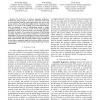Free Online Productivity Tools
i2Speak
i2Symbol
i2OCR
iTex2Img
iWeb2Print
iWeb2Shot
i2Type
iPdf2Split
iPdf2Merge
i2Bopomofo
i2Arabic
i2Style
i2Image
i2PDF
iLatex2Rtf
Sci2ools
IROS
2006
IEEE
2006
IEEE
Improving Sequential Single-Item Auctions
— We study how to improve sequential single-item auctions that assign targets to robots for exploration tasks such as environmental clean-up, space-exploration, and search and rescue missions. We exploit the insight that the resulting travel distances are small if the bidding and winner-determination rules are designed to result in hillclimbing, namely to assign an additional target to a robot in each round of the sequential single-item auction so that the team cost increases the least. We study the impact of increasing the lookahead of hillclimbing and using roll-outs to improve the evaluation of partial target assignments. We describe the bidding and winner-determination rules of the resulting sequential single-item auctions and evaluate them experimentally, with surprising results: Larger lookaheads do not improve sequential single-item auctions reliably while only a small number of roll-outs in early rounds already improve them substantially.
IROS 2006 | Partial Target Assignments | Robotics | Sequential Single-item Auctions | Winner-determination Rules |
Related Content
| Added | 12 Jun 2010 |
| Updated | 12 Jun 2010 |
| Type | Conference |
| Year | 2006 |
| Where | IROS |
| Authors | Xiaoming Zheng, Sven Koenig, Craig A. Tovey |
Comments (0)

